Singapore is becoming the preferred study destination for affluent Asian families
Even amid global developments and tensions, education remains a basic need for young people. Given Singapore's unique attributes and global outlook, it has become one of the most popular places for students from China and elsewhere.
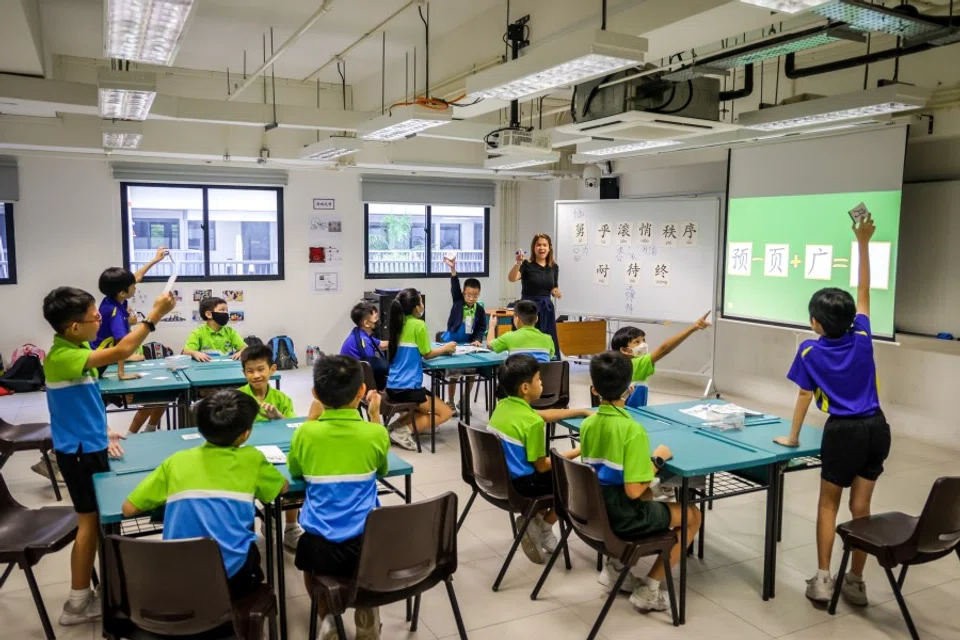
"Whenever China has conflicts with countries that are popular with Chinese students, an invisible hand pushes a new wave of these students towards Singapore," Lester Jiang Shengbo, managing partner of education consulting firm SagePaths Global Education, told Lianhe Zaobao.
Indeed, tense international relations can trigger a chain reaction and affect international students' choice of where to study. Recent incidents include the China-US trade war that intensified during former US President Donald Trump's term, Huawei CFO and deputy chair Meng Wanzhou's detainment in Canada for nearly three years, and former Australian Prime Minister Scott Morrison's call for an international investigation into the origin of the Covid-19 pandemic.
Dwindling choices for further studies
Jiang shared, "When China's diplomatic relations with Canada took a sudden plunge during the Meng Wanzhou incident, some Chinese parents were angry with the Western countries who were supposed proponents of human rights but had detained Meng. They felt appalled and removed Canada from their list of ideal study destinations."
After whittling down the list of study destinations, not many Western countries are left. The UK remains an option for some Chinese parents but they also worry that it is too far away.
Singapore hasn't been actively doing much in recent years but "actually wins by not doing anything"...
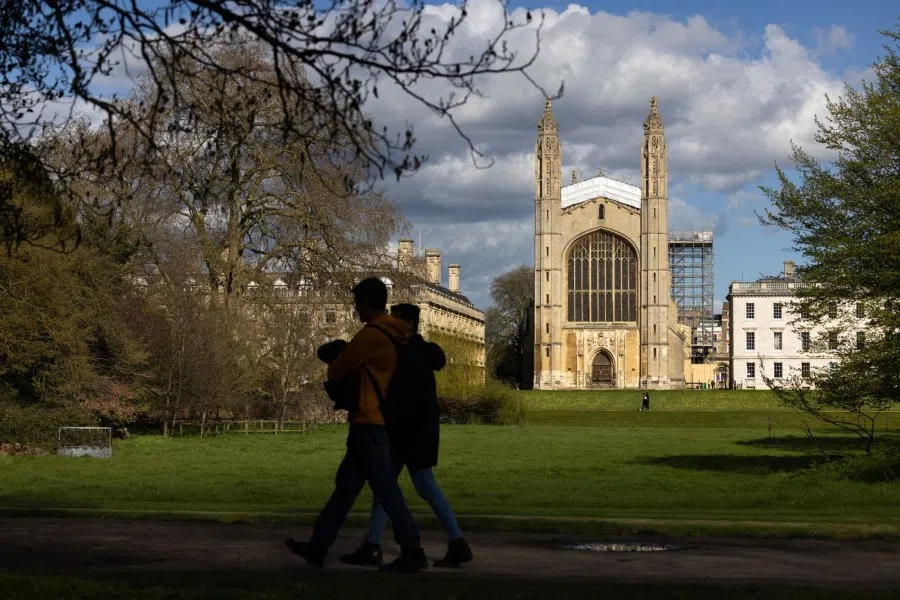
Jiang said, "The top choices left among the Asian countries are Singapore and Japan, but some students would need to learn a completely new language if they choose to study in Japan. Besides, some Chinese people still feel uneasy about sending their children there because of the history of the Japanese invasion of China in the 20th century."
He noted that Singapore hasn't been actively doing much in recent years but "actually wins by not doing anything", as it has welcomed many Chinese students.
Hong Kong was also a popular destination for mainland Chinese students, but the society gradually became divided after the Occupy Central movement in 2014, and many Chinese parents were worried about their children's safety. They decided to send their children to Singapore instead.
Meanwhile, the relationship between mainland China and Taiwan is tense, with constant talk about mainland China using force on Taiwan, so wealthy families in Taiwan are naturally planning for the future in light of this.
"Many Taiwanese parents would ask us, 'Can my child eventually apply for citizenship if they study in Singapore?'"
Hopes of citizenship
Study Journey specialises in assisting Taiwanese people with the procedures for studying in Singapore. The person-in-charge Wang Cailing said that wealthy people have the financial means to plan ahead, and if they want to move to a Chinese society, Singapore may be the only choice.
"Studying abroad is often not just about education but also migration. Many Taiwanese parents would ask us, 'Can my child eventually apply for citizenship if they study in Singapore?'"
Some parents plan to apply for Singapore permanent residency or citizenship for their children first, in the hope that it can pave the way for their own citizenship. Wang said that some parents rushed to apply for permanent residency for their children as soon as they finished primary school in Singapore, but this approach did not work.
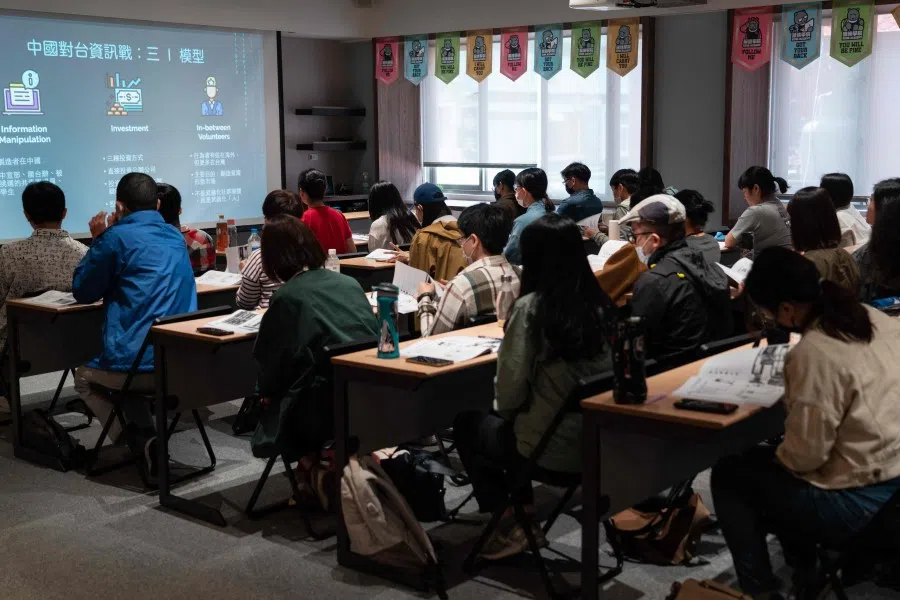
Wang added, "Many Taiwanese parents who can afford to send their children abroad are generally of good financial standing. Wealthy families who send their children to study in Singapore may also consider setting up a family office in Singapore to hold some of their funds. If something happens in Taiwan, at least they have made prior arrangements."
Besides the international situation, the policies in the home countries of the international students may also indirectly make Singapore more attractive. For example, China's "double reduction" policy and the reform of the middle school entrance exam - where there is a 50% chance of students being sent to vocational or technical schools as opposed to 20% in the past - have prompted more Chinese parents to send their children to Singapore.
US-North Korea summit put Singapore in the spotlight
Miles Education general manager Liu Yichen said that these policy changes aim to ease the pressure on students, schools and teachers, and reduce the economic burden on parents. They are meant to be transformative, but it takes a long time to implement and see results, and structural changes in the labour market are needed to support them.
"During this transitional phase, many parents cannot accept the fact that their children have a 50% chance of not being able to enter high school, and enrolling in vocational or technical schools instead. They want their children to have certificates that carry weight, so they feel that they have no choice but to seek opportunities abroad."
The agencies serving international students believe that external factors aside, Singapore itself is attractive to international students and parents given basic factors such as its social stability, public safety and urban infrastructure.
The quality of education in Singapore is also one of its highlights. Study Journey's Wang said that local government schools have always had a good reputation, but admission is not easy. However, primary and secondary school students can also choose to attend international schools, which are also very well run, and their students are known to achieve impressive results in the International Baccalaureate programme.
... more people have noticed Singapore’s advantages in the past few years, especially after the historic summit between Donald Trump and North Korean leader Kim Jong Un in June 2018...
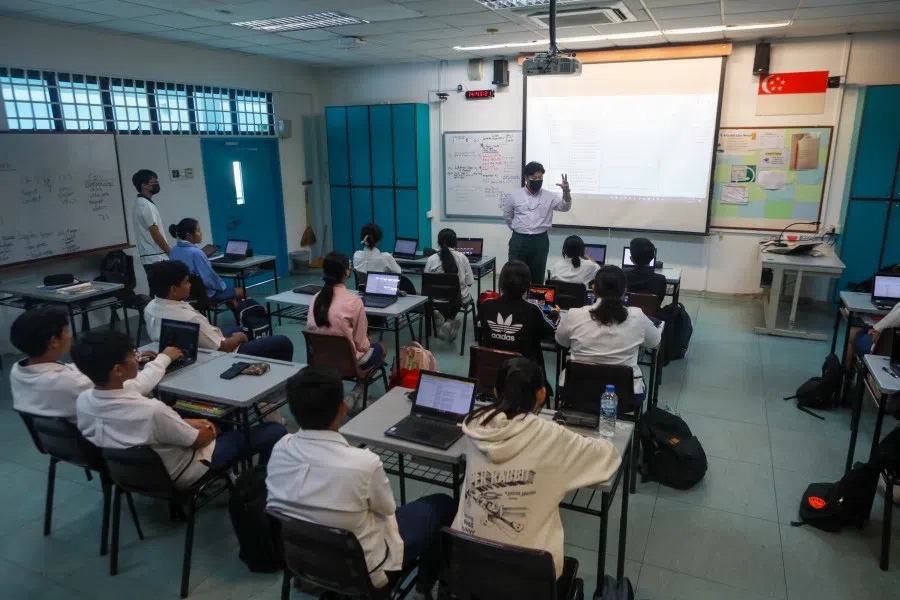
Miles Education's Liu believes that more people have noticed Singapore's advantages in the past few years, especially after the historic summit between Donald Trump and North Korean leader Kim Jong Un in June 2018, which significantly increased the profile of the island nation among the international community.
Liu remarked, "Many parents suddenly took notice of Singapore and became aware of its development and educational advantages, leading to a trend of studying in Singapore. When the wind blows, opportunities fall to countries that are prepared."
High rent and living expenses a deterrent
Since the Covid-19 pandemic disrupted their plans, international students have been coming in droves after the reopening of Singapore's borders. Industry players reveal that enquiries for agency services have significantly increased since the end of last year, with some seeing a four to five times increase, and even ten times increase.
Liu noted that although there are many enquiries, it does not mean that all of them will be able to flood into Singapore to study at the same time, given the limited number of available slots in the schools. The Singapore market is still digesting the backlog of demand caused by the pandemic, but it is expected to gradually stabilise and recover to pre-pandemic levels in the second half of the year.
According to data from the Ministry of Education and the Immigration and Checkpoints Authority, there are 79,300 foreign student pass holders in Singapore in January this year, an increase of 25% over the 63,600 students in the same period last year. The authorities said that the number of foreign students varies from month to month, generally with more coming in January and August when the new academic year begins.
The average number of international students in local primary and secondary schools and junior colleges is less than 5%, while in polytechnics and public universities, it is less than 10%. One out of every two international students is enrolled in a private educational institution, including international schools.
... the company had to adjust its promotional slogan and describe Singapore as "the preferred study destination for affluent Asian families".
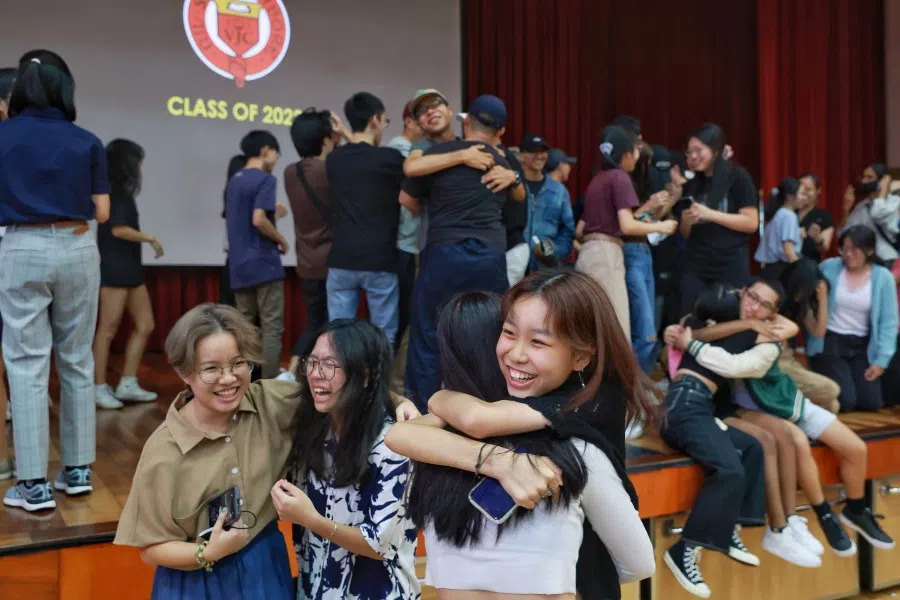
But while there are many things about Singapore that attract international students and parents, there are also some deterrence factors - the worst being the high inflation rate and skyrocketing rent, which make the cost of studying in Singapore unaffordable for middle-class families.
SagePaths' Jiang said that Singapore was very popular among middle-class families, but its position has been redefined. The cost of studying in a private school in Singapore was previously around S$30,000 to S$50,000 (US$22,480 to US$37,470) per year, but now it costs S$50,000 to S$80,000. Given these changes, the company had to adjust its promotional slogan and describe Singapore as "the preferred study destination for affluent Asian families".
Jiang found that due to the rising cost of studying abroad in Singapore, fewer Southeast Asian international students are pursuing their bachelor's and master's degrees in private universities in Singapore. Instead, they are turning to Australia.
Tuition fees based on nationality
In addition, there has been a significant drop in the number of enquiries from young students from Southeast Asia to study abroad over the past two to three years due to the impact of the pandemic and the difficulty of enrolling into local primary and secondary schools.
Miles Education's Liu also pointed out that the fees for government schools have been rising. For example, the monthly fees in private secondary schools cost between S$1,600 and S$1,700, but non-ASEAN foreign students already need to pay between S$1,600 and S$1,770 to attend local secondary schools.
Liu said, "This is a turning point. With the cost of learning at public schools being higher than at private schools, the target group will inevitably be pushed to the top of the pyramid, potentially filtering out quality students from middle-class and lower-income families. While the Singapore government wants to attract talent, talents first need the support of financial resources nowadays."
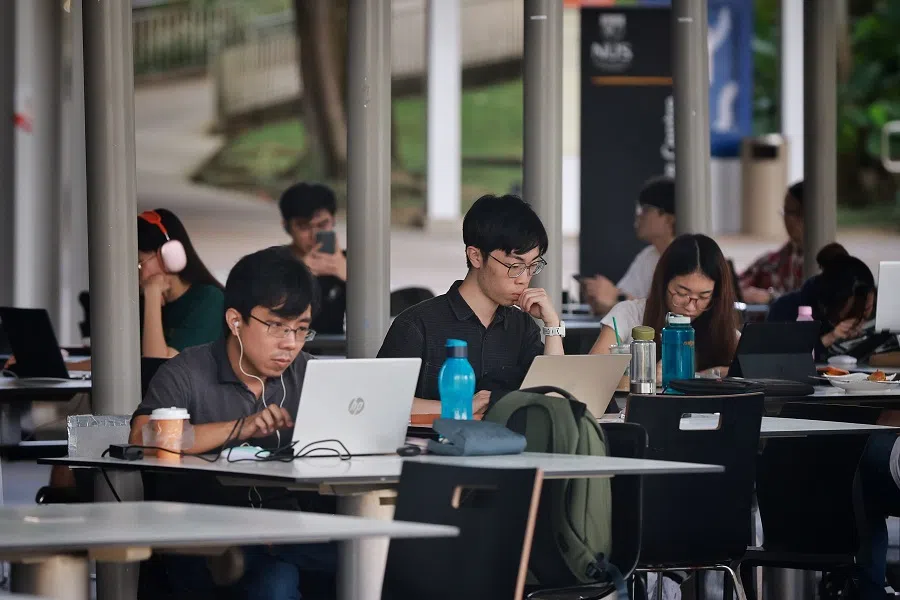
In response to Zaobao's query, the Singapore Ministry of Education said that while it values the diversity that international students bring to local schools, Singapore's education system is designed and built to serve the needs of the locals. Thus, tuition fees are differentiated based on nationality to reflect the privilege that Singapore citizens are entitled to.
The ministry also pointed out that international students generally pay lower tuition fees if they choose to study in public schools or government-aided schools compared with international schools. International students in need of financial assistance can seek advice from schools, the community or welfare groups about assistance schemes that are available to them.
Case study 1: conducive study environment and quality of education more important
Yang Xinyi, a 23-year-old from Shanghai, graduated with a bachelor's degree from Fudan University's Department of Chinese Language and Literature before heading to the Lee Kuan Yew School of Public Policy at the National University of Singapore (NUS) to pursue her master's in international affairs in July 2021.
Although deteriorating China-US relations have affected the choice of study destination of some students and parents, Yang did not take the matter into account when making her decision to come to Singapore.
She said, "The international situation is just temporary and could change anytime. Having a conducive environment to study is more important. The quality of education does not get affected by the ebbs and flows of bilateral relations."
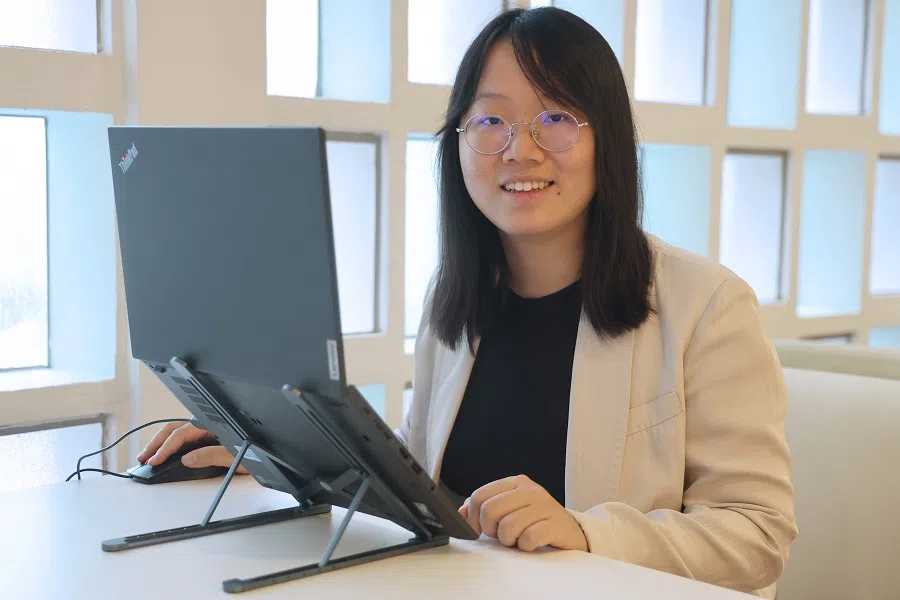
Apart from the Lee Kuan Yew School of Public Policy, Yang applied to American universities as well. The US remains an attractive study destination as it is the birthplace of public policy programmes.
"But my mother thinks that the US is not safe, especially during the Covid-19 pandemic, when Chinese media reported on the severity of the US pandemic situation. Ordinary people like us think that the US government was not as rigorous as Singapore in handling the outbreak," she said.
In January 2021, Yang was recommended by a Fudan University professor to participate in a three-month internship at the United Nations headquarters in New York, where she met her Singaporean supervisor. At the time, Yang had received acceptance letters from the Lee Kuan Yew School of Public Policy and Georgetown University's McCourt School of Public Policy. She was struggling to decide where to go, but eventually went with Singapore upon the suggestion of her supervisor.
As Singapore's population is predominantly Chinese, sharing the same language and ethnicity was one of the considerations for Yang in deciding where to further her studies.
She also compared the programme offered by both schools, and ultimately chose the Lee Kuan Yew School of Public Policy, as the course offered there had a stronger theoretical foundation, and would be more suitable for her given that she plans to study for a doctorate degree. Furthermore, because getting into NUS is extremely difficult, having capable peers would mean that everyone can encourage and learn from one another, and improve together.
As Singapore's population is predominantly Chinese, sharing the same language and ethnicity was one of the considerations for Yang in deciding where to further her studies. After arriving in Singapore, she found that her peers also came from different countries, including India, France and Canada, which made her student life more exciting.
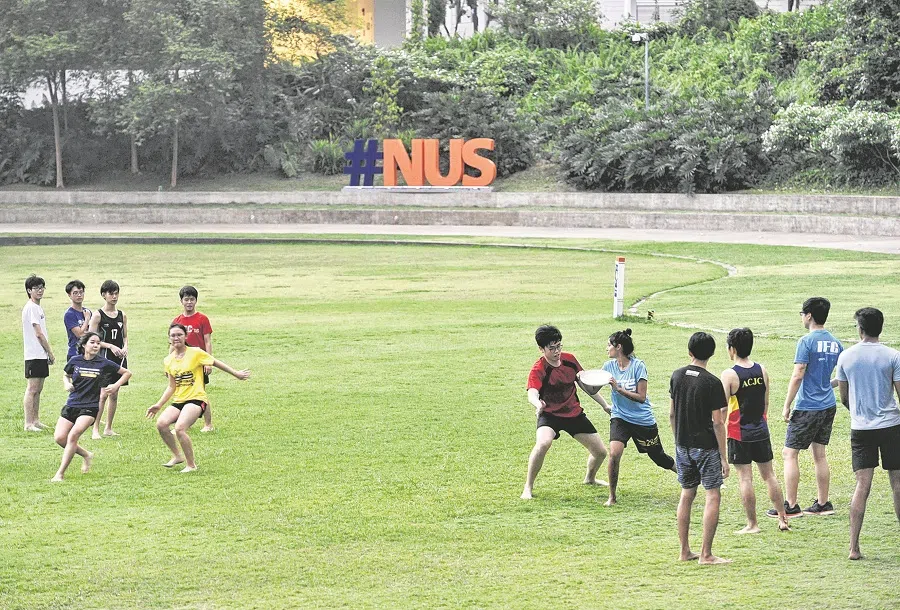
As foreign students lived in hostels, they often gathered together for meals, especially during the festivities. Everyone would share about the happenings or situations in their home countries, which Yang found incredibly interesting.
Yang has completed her thesis and is about to graduate. She hopes to find a job in Singapore. "A classmate said that his dream is to work in five countries before the age of 30, which I find is a great idea. But I won't have the chance to do that if I returned to China. I would have to quickly enter the workforce, marry, buy a house, and service a home loan. It's a boring life," she said.
She explained, "I hope to work at an international organisation or think tank, which would be quite hard to do in China. For example, many positions at the Asian Infrastructure Investment Bank are in fact occupied by government officials. If I work abroad, say in a policy consulting firm, I would have more flexibility and possibilities to change jobs later on."
Case study 2: fostering a global perspective
In January this year, a Taiwanese YouTube couple enrolled their children - a secondary three daughter and a secondary one son - in Singapore's international school to broaden their horizons and plan for the future. The couple, Jou Gang Yi, 42, and Huang Yi Ling, 36, has been running their YouTube channel for six years and has amassed over 780,000 subscribers.
Unsure about when tensions in the Taiwan Strait will subside, some Taiwanese parents are sending their children to study abroad, paving the way for future emigration plans. As the Jou couple have relocated to Singapore for their children's education, some people assume that they are preparing to permanently migrate to Singapore.
"But from a different perspective, we brought our children to study in Singapore because we want them to see the world and understand how the outside world sees Taiwan and mainland China."
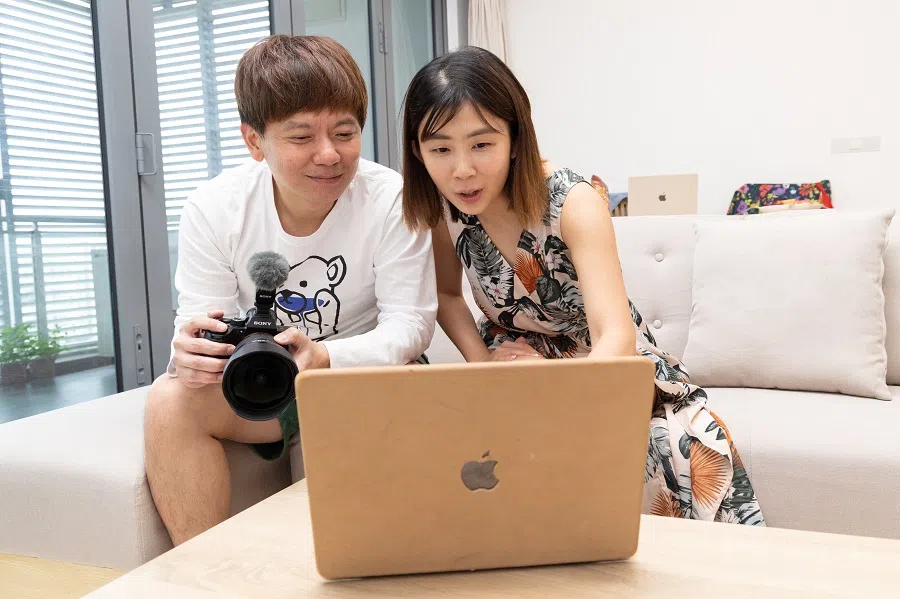
Jou said, "Our generation has experienced a lot, from the Taiwan Strait Crisis in the 1990s to the tensions in the Taiwan Strait triggered by then US House Speaker Nancy Pelosi's visit to Taiwan last year. But Taiwan is our home, so we will not leave just for these reasons.
"But from a different perspective, we brought our children to study in Singapore because we want them to see the world and understand how the outside world sees Taiwan and mainland China," he shared.
"In a few years' time when they grow up, they will form their own opinions and ultimately leave us. Whether they decide to return to Taiwan, stay in Singapore, or head to the UK or even the mainland or other countries to further their studies, we will respect their decision," Jou added.
He stressed that even if did not leave Taiwan, the kids would still be able to see the world, but Taiwan is admittedly not as globalised as Singapore.
Huang's greatest wish as a mother is to see her children learn English in an English-speaking environment, nurture their interests and grow up happily and healthily. She said, "My daughter immediately agreed to study in Singapore because she sees more possibilities here. She knows that learning English will open more paths in the future."
Huang said, "We didn't know that rental prices would be so high - 20% higher than what we had expected."
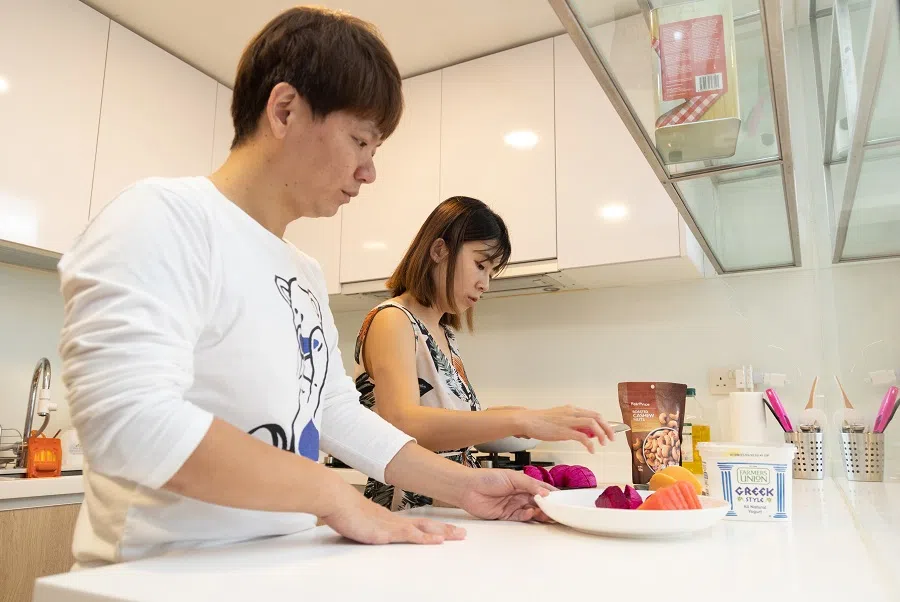
The Jou family had visited Singapore numerous times and fell in love with the country. They initially planned to relocate to Singapore about three years ago, but their plans were derailed by the pandemic. After seeing that life had returned to normal in Singapore when they visited last July, they decided to proceed with the move.
A reason why they chose Singapore is because of its close proximity to Taiwan, making it convenient for them to return home. The couple still has to make frequent trips back to Taiwan for work.
Safe environment to nurture independence
The Jou family live in a hilly area of Taipei, so accessibility is limited which restricts their children's social activities, and the couple had to drive their children to and back from school. In contrast, Singapore has an accessible transport system and a safe environment. The couple is comfortable with letting their children make their own way to and back from school, as well as spend time with their friends and classmates, to foster their independence.
The most unexpected part of the relocation process was the challenge of finding accommodation. The couple initially wanted to rent a home near the school, but their hopes were dashed by Singapore's red-hot property market.
Although they were already used to high property prices in Taipei, they were still astounded by Singapore's sky-high rental prices. Huang said, "We didn't know that rental prices would be so high - 20% higher than what we had expected."
This article was first published in Lianhe Zaobao as "国际局势推波助澜 小红点聚光照亮留学新标的".
Related: China's young families sending kids to international schools in Thailand | Covid curveballs making Chinese students' road overseas even longer | Post-00s youths want to rewrite workplace norms in China | Chinese returning talents losing their shine? | Study in the US? Chinese students are having second thoughts





